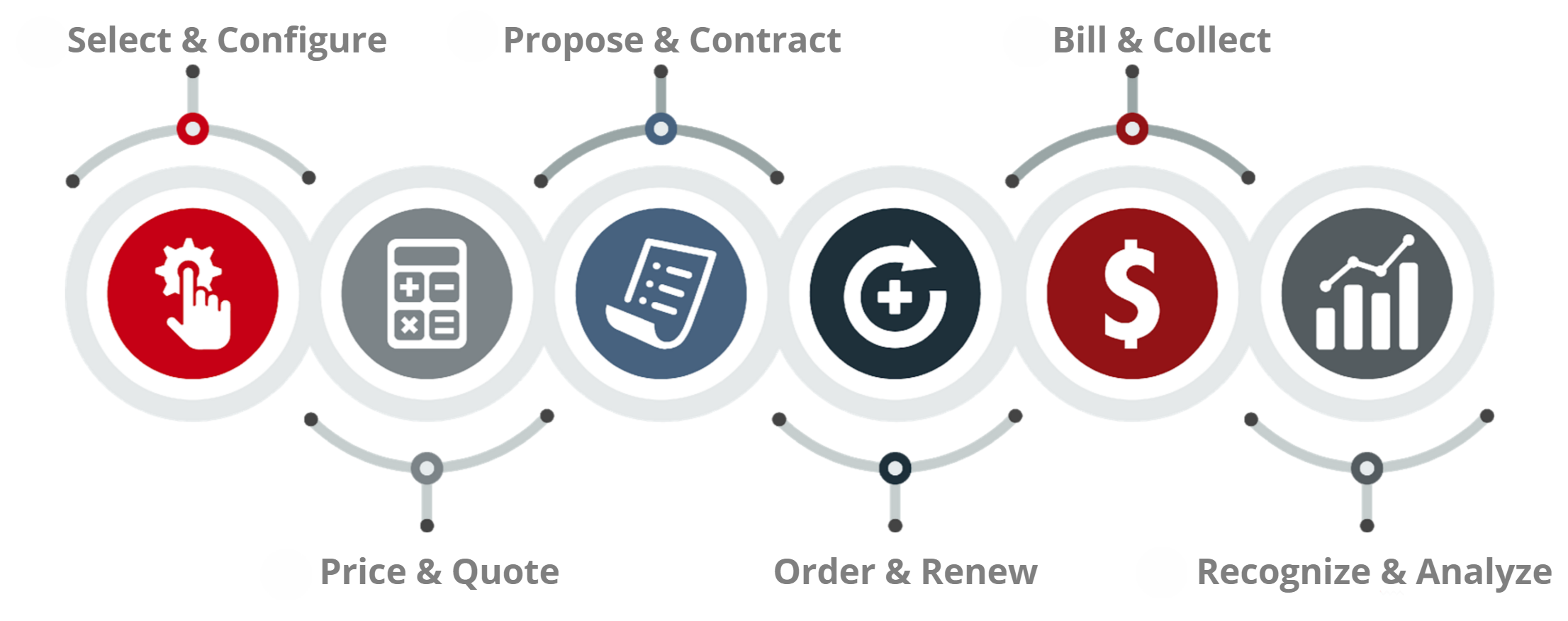
Get your FREE 30-day trial.
Please complete all fields.
This is the fifth in an eight-part series looking at the typical failure points in the last mile of the sales cycle, often referred to as the quote-to-cash process.
In our last installment, we looked at the propose & contract step in the Quote to Cash (QTC) process, which enables automated creation of the proposal and the accompanying contract that is sent to the customer. Once again, completeness and accuracy help avoid risk and increase your chances of winning deals, while faster and streamlined approvals and reviews help shorten sales cycles.
In this installment, we’ll look at the next step of the process, where you’ve won the deal (yay!) and your QTC solution now converts the elements of the deal into an accurate order that is automatically pushed to your back-end financial systems. It’s also where renewals are turned into automatic quotes when renewal cycles pop up.
With automated QTC, you’ve accelerated the last mile of the deal by letting your team quickly build and present an offer to your customer. The customer has accepted, and now you need to turn that quote into an order that your back-end financial and billing systems can easily accept.
Automation is the key here, with its ability to eliminate manual errors that can waste time and cause concern with new customers. Not only does automation streamline the conversion of quotes into valid orders, it also enables you to include any necessary workflows and approvals that may be required based on your policies or the parameters of an individual deal.
Automation also eases reporting, which helps you to conform to requirements, alert others, and record delivery or service activations. Plus, it gives a window into monthly recurring revenue (MRR) and total contract value (TCV) when subscription billing is involved.
Subscription billing quotes can include items such as setup charges, one-time transactions, complex or time-dependent discounts, and time-based renewals. Complexity increases with “freemium” plans or evergreen plans that never expire, customer upgrades and downgrades, prorated terms, and auto-renewals. Subscription billing magnifies the complexity of an order, but automation helps eliminate errors and alerts you to anomalies when necessary.
However, no matter how you structure your quotes, you should expect your QTC system to quickly convert your quotes into clean orders that integrate with the needs of your finance policies and the technical requirements of your financial systems. The order should easily flow into your back-end tools, even if you need to split orders across systems or have other specific requirements due to multiple or legacy back-end software solutions.
With automation to convert a quote into an order, this type of tight software and systems integration enables a fast and accurate view into your business, proving better forecasting, planning, compensation management, and more.
Another benefit of automated QTC is its ability to remove manual activities from the renewal process, whether or not subscription billing is involved. It automatically generates renewal opportunities in Salesforce and creates quotes at the right time, eliminating manual effort and creating accurate and complete renewal quotes based on the specifics of each deal. When there are add-ons, deal-specific requirements, or contractual obligations, automation ensures that renewal orders are instant, accurate and complete.
Forcing your team to manually create renewal orders not only (and yet again) introduces the potential for human error (and the potential to miss renewals altogether), it adds workload and time burdens to their already busy schedules. Reps should be devoting time to growth, not worrying about maintaining renewals and reminders that can be automatically generated to eliminate worry about missing a deadline or a contractual date.

Automated orders & renewals pushes your approved and accepted quotes to your back-end financial, accounting, and other systems. It eliminates the risk and time of manual data entry and re-entry, it provides faster and more accurate visibility into revenue streams, and it helps to ensure timely, accurate, and complete renewals.
Automation also provides a complete picture of your current revenue streams, more accurate forecasts, improved customer loyalty, increased employee productivity and no more missed renewals!
For Nimble Storage, success meant rapid growth, both in revenue and number of products. Prolific output can be a good thing, but their existing quoting solution couldn’t keep up, nor could their sales reps. With a large team spread across the globe, Nimble Storage was relying on a complex, spreadsheet-based quoting and sales order system that was quickly becoming unwieldy.
Nimble Storage needed an affordable quoting tool that integrated easily with their Salesforce CRM platform to streamline the quoting process and also provide flawless data reporting. They found the perfect tool in Salesforce CPQ.
Prior to using Salesforce CPQ, transitioning quotes to sales orders required a complex set of manual steps, from using a spreadsheet on their laptops to a risky, field-by-field copy/paste to move data into their ERP system. Using Salesforce CPQ, reps now create quotes seamlessly, quickly, and even remotely with no fear of data-entry snafus, processing errors, or missed pricing updates. Plus, the complaints that managers frequently heard about the cumbersome quoting process have totally disappeared.
“Configuration errors are now almost nonexistent due to the rules put in place by Salesforce CPQ’s product configuration engine,” said Ruchika Chopra, Manager Sales Operations at Nimble Storage. “For our admins, the order entry process has decreased from roughly twenty minutes to as little as two minutes per quote.”
To learn more about Nimble Storage's QTC journey, download our customer stories.
Next, we’ll dive into the “bill & collect” phase of the QTC process, where your invoicing, collections, taxes, and reporting are all managed.